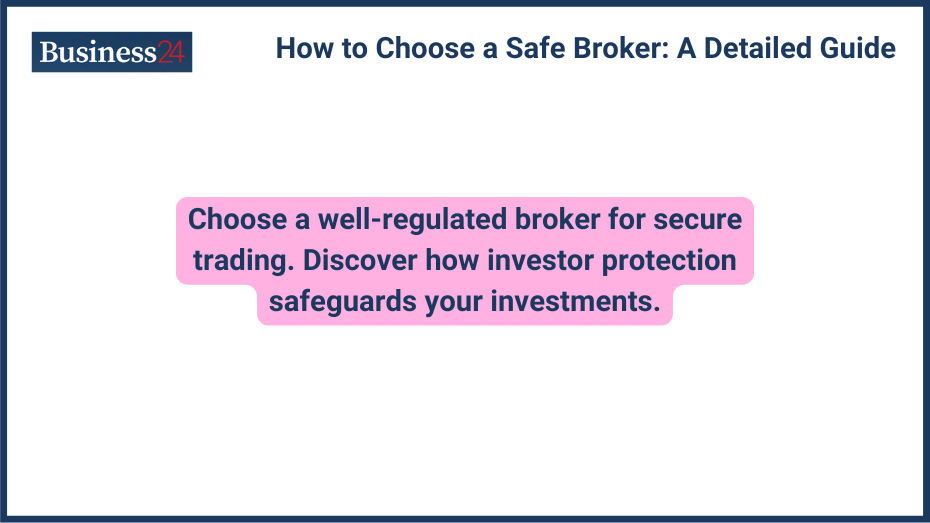
Choose a well-regulated broker for secure trading. Discover how investor protection safeguards your investments—start trading with confidence today.
The platform and service provider are as important as a trader’s trading strategies. Sometimes, a broker glitch can lead to thousands of dollars in losses, and a winning position can turn into a losing one if the service is not good. All these factors make it important for a trader to operate in the market smoothly.
Choosing a reliable and regulated broker is crucial when trading financial instruments. A reputable broker ensures the safety of your funds, provides a secure trading environment, and adheres to industry standards. A regulated broker is more likely to be financially strong and less likely to engage in fraudulent activities.
Regulation and Licensing
Verifying regulatory status with authorities (e.g., SEC, FCA)
One of the most important factors to consider when choosing a broker is its regulatory status. A regulated broker is subject to oversight by a financial regulatory authority, ensuring it complies with industry standards and regulations.
Some of the leading financial regulatory authorities include:
- Securities and Exchange Commission (SEC): The SEC is the primary regulator of securities markets in the United States.
- Financial Conduct Authority (FCA): The UK’s financial regulator is the FCA.
- Australian Securities and Investments Commission (ASIC): The ASIC is the Australian financial regulator.
You can verify a broker’s regulatory status by checking its website or contacting the relevant regulatory authority. Look for a statement clearly indicating the broker is regulated by a specific authority. You can also search for the broker’s name on the regulator’s website to confirm its registration status.
Benefits of working with regulated brokers
Working with a regulated broker offers several benefits:
- Safety of Funds: With a reputed broker, you don’t have to worry about your funds vanishing or being blocked. This means that your funds are protected in case the broker goes bankrupt. If a broker goes bankrupt, your funds will be returned to you up to a certain limit. This is because regulated brokers must hold client funds in segregated accounts, separate from the broker’s funds.
- Fair Dealing: Regulated brokers are required to treat all clients fairly and equitably. This ensures that you are not being treated unfairly or discriminated against. Regulated brokers must provide all clients with the same level of service and information. They must also avoid conflicts of interest and act in the best interests of their clients.
- Investor Protection: Regulated brokers are subject to various investor protection measures, such as dispute resolution procedures and compensation schemes. These measures can help to protect your rights as an investor. If you have a dispute with your broker, you can use the regulator’s dispute resolution procedures to try to resolve the issue. You may also be eligible for compensation if you suffer a loss due to your broker’s misconduct.
Security of Funds
Security is an important factor; a good broker follows the following measures:
- Segregation of client funds: A secure broker will segregate them from their funds. This means that your money is kept separate from the broker’s operating capital, providing additional protection. If the broker goes bankrupt, your funds are more likely to be returned to you if they are segregated.
- Investor protection schemes (e.g., SIPC, FSCS) Many countries have investor protection schemes to safeguard client funds in case a broker goes bankrupt. For example, the Securities Investor Protection Corporation (SIPC) in the United States protects up to $500,000 per customer, including $250,000 in cash. The Financial Services Compensation Scheme (FSCS) in the United Kingdom protects for up to £85,000 per person.
Transparency and Fees
Transparency is another factor that differentiates a good broker from a fraud. A broker just wanting your money will levy different hidden charges, which can be too much. Be aware of hidden fees that may be associated with trading. Ensure you understand the entire cost structure, including commissions, spreads, and other fees. Some brokers may charge additional fees for certain services or features. It is important to carefully review the broker’s fee schedule to understand all the costs involved.
A reputable broker will have clear terms and conditions that outline your rights and obligations. Review these carefully to understand the rules and regulations governing your trading activities. The terms and conditions should clearly state the broker’s fees, dispute resolution procedures, and other important information.
Reputation and Reviews
- Checking broker reviews and ratings: Many social media platforms or sites contain genuine user feedback that can help you find a good broker. Research the broker’s reputation by reading reviews and ratings from other clients. Look for feedback on their customer service, trading platform, and overall reliability. You can find reviews on various online platforms and forums.
- Trustworthiness based on user feedback and history: You can also analyze the broker’s trustworthiness based on their history and reputation. Consider how long they have been in business and if there have been any major complaints or scandals. A reputable broker will have a positive track record and be committed to providing excellent service to its clients.
Customer Service and Support
Sometimes, you might need to contact customer service and support to know about your holding or anything else. A good communication channel between customer service and support to users is also an important factor:
Quality of customer service
A reputable broker will provide excellent customer service and support. Look for a broker that offers multiple communication channels, such as phone, email, and live chat. A good broker will have a dedicated customer support team available to assist you with any questions or problems you may encounter. Broker’s response time and customer support effectiveness are also important. Look for a broker that responds to your inquiries promptly and provides helpful and informative answers.
Availability of multiple support channels
Ensure the broker offers multiple support channels to promptly address your queries and concerns. A reliable broker will have a dedicated customer support team to assist you. You can easily contact the broker by phone, email, or live chat. The broker should also have a comprehensive FAQ section to answer common questions on their website.
If you are not a native English speaker or any other language, ensure the broker offers support in your preferred language. This will make it easier for you to communicate with the broker and get the assistance you need.
Trading Platforms and Tools
You will be using the platform and tools more than anything, so make sure you have everything you need with your broker:
- Assessing platform usability and features: A user-friendly platform with advanced features can enhance your trading experience. Look for a platform that is easy to navigate, provides real-time quotes, allows for multiple chart types, and offers a variety of order types. Important trading tools include the ability to trade on the go using a mobile app, features that allow you to follow other traders and copy their trades, and access to educational materials, such as webinars, tutorials, and market analysis.
- Demo accounts to test before committing: Many brokers offer demo accounts that allow you to practice trading without risking real money. This can help you familiarize yourself with the platform’s features, test different trading strategies, and assess whether the platform meets your needs.
Additional Safety Checks
Here are some of the additional safety checks you can perform while evaluating a broker:
- Cross-checking broker details on scam watchlists
Be cautious of unsolicited offers and promotions. Legitimate brokers will not pressure you to invest or offer unrealistic returns. If you receive unsolicited offers or promotions, be wary and do your research before investing. You can also check scam watchlists to see if the broker has been reported for any suspicious activity.
- Monitoring for red flags like unsolicited offers
Watch out for red flags such as unsolicited offers, promises of guaranteed returns, or pressure to invest. Legitimate brokers will never pressure you to invest or make unrealistic promises. If a broker is trying to pressure you to invest, it is a red flag that they may need to be more reputable.
- Understanding the broker’s business model
Different brokers have different business models. Some brokers may earn revenue from commissions on trades, while others may earn revenue from the spread between the bid and ask prices. Understanding the broker’s business model can help you assess their incentives and potential conflicts of interest. For example, a broker that earns revenue from commissions may be incentivized to encourage you to trade more frequently. In contrast, a broker that earns revenue from the spread may have an incentive to provide a narrower spread.
- Avoiding high-pressure sales tactics
Be wary of brokers who use high-pressure sales tactics to persuade you to invest. Legitimate brokers will provide information and allow you to make your own decisions. Avoid brokers who try to pressure you to invest or make unrealistic promises.
- Conducting due diligence
Conduct thorough due diligence before investing with a broker to ensure that they are reputable and reliable. This includes checking their regulatory status, reading reviews, and understanding their business model. You should also consider the broker’s fees, trading platform, and customer support.
Disclaimer
eToro is a multi-asset platform which offers both investing in stocks and cryptoassets, as well as trading CFDs.
Please note that CFDs are complex instruments and come with a high risk of losing money rapidly due to leverage. 51% of retail investor accounts lose money when trading CFDs with this provider. You should consider whether you understand how CFDs work, and whether you can afford to take the high risk of losing your money
This communication is intended for information and educational purposes only and should not be considered investment advice or investment recommendation. Past performance is not an indication of future results.
Copy Trading does not amount to investment advice. The value of your investments may go up or down. Your capital is at risk.
Don’t invest unless you’re prepared to lose all the money you invest. This is a high-risk investment and you should not expect to be protected if something goes wrong. Take 2 mins to learn more
eToro USA LLC does not offer CFDs and makes no representation and assumes no liability as to the accuracy or completeness of the content of this publication, which has been prepared by our partner utilizing publicly available non-entity specific information about eToro.
